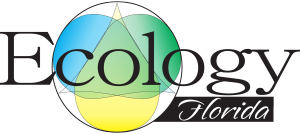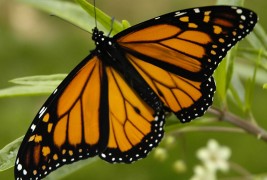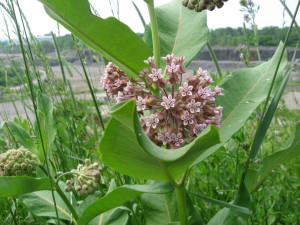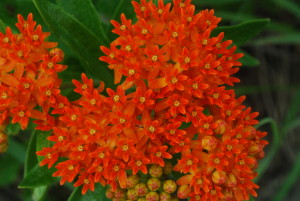Ecology Florida Staff
Ecology Florida supports the addition of Monarchs to the Endangered Species List
A timely report from Organic Consumers Association has been released with an emphatic headline: “Save the Monarch from Monsanto.” The report advocates support for a petition generated by the Center for Biological Diversity and the Center for Food Safety, which seeks protection for the monarch butterfly under the Endangered Species Act. Ecology Florida joins these and other groups in this effort. For more information, and to add your name to the petition, click here. The deadline for expressing support is March 2. So, please act now.
See also this fine study from the Center for Food Safety, “Monarchs in Peril.”
Not All Agree
Here is a less sympathetic view from Daniel Rubinoff, “Monarch butterfly doesn’t need so much help.” Rubinoff argues that resources devoted to the monarch are ill-spent since their populations are relatively healthy, overall, and other endangered species would benefit more from those resources.
Our Response: Enlarging the Circle of Compassion
To which we respond: resources and attention should be directed to as many projects as possible, and at present the monarch is positioned to benefit from public interest and government support. Rubinoff and others are encouraged to make the case for support of other species, several of which he mentions in the article. We will make the case, too, and direct others to his article. In the meantime, let the monarchs’ cause célèbre generate all the support and interest that it can, and as a consequence the circle of compassion is drawn a little wider, including even more species than before.
Here is how this circle works: were it not for Rubinoff’s article we would not have known about “Appalachia’s spruce-fir moss spider or California’s Kern primrose sphinx moth” or “Hawaii’s fabulous green sphinx moth…. the last of its kind.” But we would not have run across Rubinoff’s article at all were it not for the monarch. Today, tens of thousands of readers (maybe more) know the primrose sphinx moth and spruce-fir moss spider are even more endangered than the monarch – but without the threat to the monarch it is likely Rubinoff’s article would never have been written – much less published by the Washington Post and cited in Ecology Florida News. The monarch widened the circle to include those other species. We know about that spider and those moths only because of the monarch, and if we care about the monarch there is a good change we care about those others as well.
The Milkweed Connection: Get Your Local Government Involved
As many readers know, Ecology Florida advocates propagation and planting of milkweed, which is necessary for the monarchs’ survival. We especially encourage cities and counties in Florida to adopt affirmative milkweed propagation and planting programs.
Please contact your city and county leaders and ask them to join the effort to save this great migratory pollinator by including milkweed as part of all landscape projects. Individual planting efforts are also encouraged, but affirmative action by local governments will have a much more powerful impact, and bring with it encouragement to private citizens to also do their part as well.
Please let us know if your local government has policies supporting the planting of milkweed on public property. Ecology Florida News will recognize any municipality or county that has established such policies.
Remember, also, Roundup (Monsanto’s widely popular herbicide) kills milkweed – and other plants necessary for healthy ecosystems.
Grow Your Own: We’ll Help
Here is the complete list of native milkweeds from Florida nurseries (from the Xerces Society, dedicated to protecting invertebrates and their habitat):
Butterfly Milkweed (Asclepias tuberosa)
Swamp Milkweed (Asclepias incarnata)
Pinewoods Milkweed (Asclepias humistrata)
Longleaf Milkweed (Asclepias longifolia)
Aquatic Milkweed (Asclepias perennis)
Two native Milkweeds recommended by Xerces Society (and available from the Florida nurseries) are also available from Seed Savers Exchange: These are Butterfly Milkweed <aka Butterflyweed> (Asclepias tuberosa) and Red Milkweed <aka Swam Milkweed> (Asclepias incarnata).
Interestingly, these two are the seeds most needed in the Southeast, according to Monarch Watch.
If you would like to personally assist in our project to expand milkweed plantings in the state, for $5.00 we will send you a package of seeds of either Butterfly Milkweed (Asclepias tuberosa) or Red Milkweed (Asclepias incarnata). Your $5.00 will cover the cost of the seeds and postage to mail them.
Our seeds come from Seed Savers Exchange, dedicated to conserving and promoting America’s cultural diverse but endangered garden and food crop heritage.
Send to Ecology Florida, PO Box 596, New Port Richey, FL 34656-0596.
In the meantime, sign the petition, and contact your local government leaders.




Leave a Reply